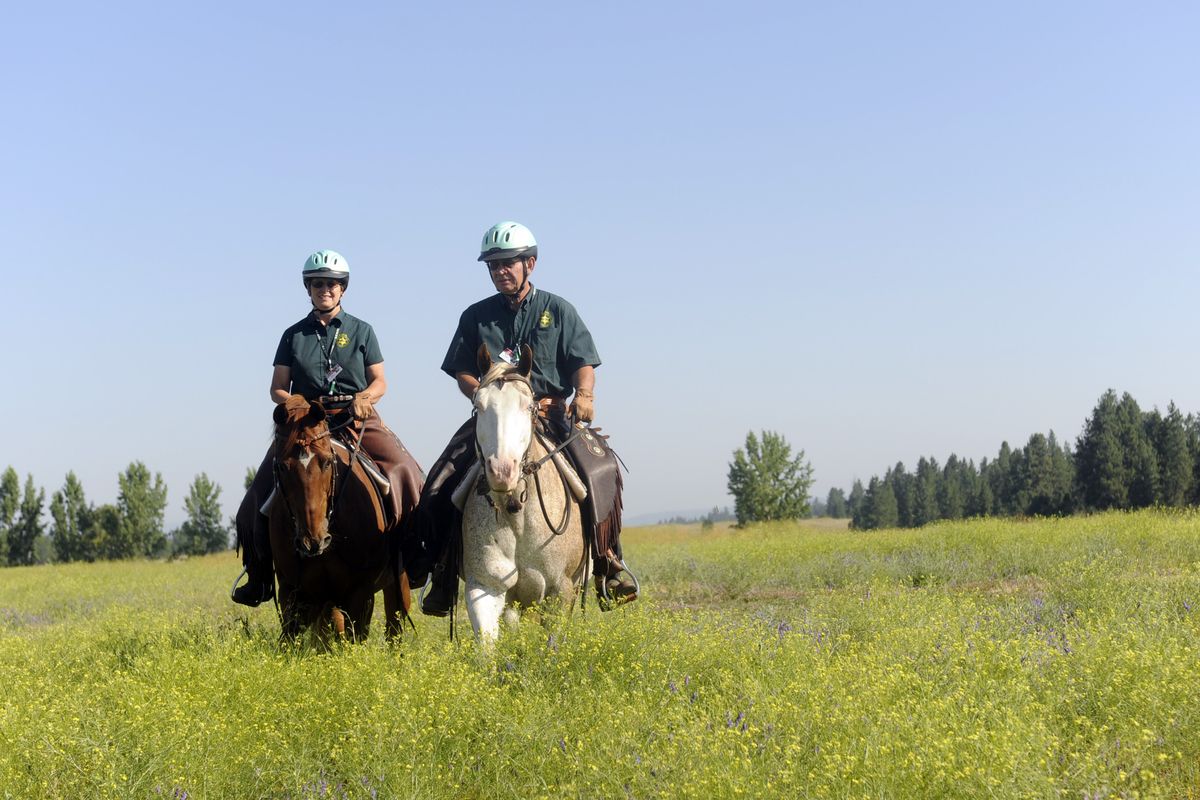Spokane County volunteers hoof it
SCOPE’s mounted patrol looks after hundreds of miles of trails

It’s a case of Wild West meets World Wide Web.
Volunteers log in online to monitor theft alerts and check weather patterns, then call headquarters before riding out to patrol rural areas on horseback.
It’s a modern-day take on the sheriff’s posse, formed in 2004 by then-Spokane County Sheriff Mark Sterk to help stop trespassing on land near the county’s off-road vehicle park.
The mounted patrol is now one of 19 stations under SCOPE – Sheriff’s Community Oriented Policing Effort – a program that provides neighborhood-centered support for deputies and officers across the county.
Like other SCOPE teams, the mounted patrol helps track stolen belongings, participates in community service and scans the countryside for suspicious activity, among other tasks.
Its mailing address is in the city of Airway Heights, but this station has no walls. “We’re the only SCOPE station that doesn’t have a bricks-and-mortar location,” said Michelle LeVar, secretary and Web developer for the mounted patrol. “Since we have members all over the county, our station is really our Web site.”
A members-only area of the site lets volunteers fill out paperwork, view an events schedule and stay in touch from any place with an Internet connection.
This lack of a geographic anchor allows for better service to a demographic that’s a little different than your typical metropolitan area, said LeVar.
“Cities have neighborhood watches pretty much covered, but getting people in the country to watch out for one another sometimes takes a little work,” she said. “Farmers, ranchers, horse breeders – these are people who are often singularly very independent.”
LeVar and her husband, Mike Bryarly, who trains mounted SCOPE volunteers, have been “horse people” for many years, which makes them well-suited to help run the mounted patrol. Like many of the other 16 active volunteers, the two are retired, and they have given around 75 to 100 hours a month to the program for the past four years – well over the four hours required. “This is a way of life; it never was a hobby for either one of us,” LeVar said.
As well as horses, a few riders in the group work with mules, which LeVar said are a tremendous asset to the station. “Mules bring a different kind of equine temperament to the equation,” she said. “They have stamina and common sense that’s hard to measure.”
In the process of training horses and mules, a close bond often develops between owner and animal. “Once you’re on their level and they’re on yours, it’s probably the best alien relationship you could hope for,” said LeVar. “They become your better eyes and nose and you help them understand things they’re going to ride through that have never been a part of their world, like traffic. They learn to trust you.”
Part of the mounted patrol’s mission is public outreach and education – teaching horse-handling safety or ways people can protect themselves and their belongings from crime.
The group’s primary undertaking, however, hasn’t changed from its early days. “We’re very blessed on this side of the mountains and in this county in particular to have so many public lands with non-motorized trails,” said LeVar.
Hundreds of miles of trails require frequent looking after – a costly and time-consuming prospect for law enforcement and parks services. Volunteers who regularly ride the trails can alert busy authorities of anything urgent and notify land managers of any problems in the backcountry.
Spokane County’s SCOPE, funded through the U.S. Department of Justice and private donations, is one of the highest-ranked citizen patrol programs in the nation, according to SCOPE director Rick Scott. “A lot of other cities, from Niagara Falls to Atlanta, are trying to figure out what we’re doing so they can emulate it,” he said.
Having qualified volunteers help with duties like traffic control and neighborhood watch “allows deputies to do more with their time,” Scott said, adding that a good relationship between SCOPE and local police unions is key to the program’s success. “We’re appreciated,” he said. “The union wants our help and they realize we’re not trying to take their jobs.”
LeVar said that, with the economy in a slump, programs like SCOPE are more needed than ever.
“It’s vital to have a core of people you can depend upon who aren’t vigilante in nature and can help be your eyes and ears,” she said. “A lot of communities, they just don’t have anything like this.”